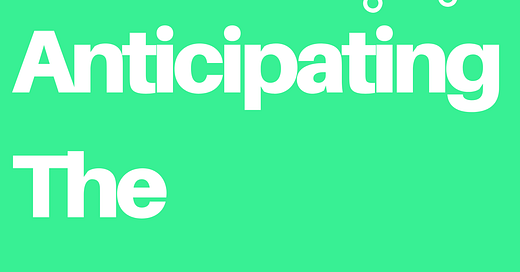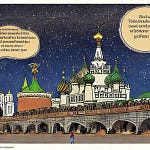Note: Sorry for the delay in the mid-week edition. Life intervened
This newsletter is really a public policy thought-letter. While excellent newsletters on specific themes within public policy already exist, this thought-letter is about frameworks, mental models, and key ideas that will hopefully help you think about any public policy problem in imaginative ways. It seeks to answer just one question: how do I think about a particular public policy problem/solution?
Welcome to the mid-week edition in which we write essays on a public policy theme. The usual public policy review comes out on weekends.
PS: If you enjoy listening instead of reading, we have this edition available as an audio narration on all podcasting platforms courtesy the good folks at Ad-Auris. If you have any feedback, please send it to us.
- RSJ
Readers are sending in all sorts of questions. So, our parampujya guru of economic and political reasoning, Prof. Arthananda Ilyich Smith-Hayek (AISH), is back. Prof AISH is a home-grown economist without a single videshi bone or cartilage in him. He is a veritable sangam of three key economic streams – Neoclassical, Marxist and Austrian – whose advice can be safely consumed in these low trust times.
Over to the burning question.
Dear Prof,
The CEO of Niti Aayog yesterday complained we have too much democracy in India. He later claimed he was misquoted. That, of course, dispelled any remaining doubt among us that he had indeed made that statement. All hell broke loose. Memes appeared, Immanuel Kant was quoted, and Twitter had a field day with the usual leftist malcontents suggesting fascism is nigh. I don’t understand this. All my life living in India I have felt we have too much democracy. Nothing moves in India because everyone has a say. You can’t get anything worthwhile done because no one is willing to pay any price. We elect goons and criminals because every fool has a vote. Anything that’s good for the majority can be hijacked by a minority that’s vocal and organised. We have all seen this. How can we outrage over the ‘too much democracy’ comment when we know it is true? What do you have to say? I hope you are wise enough to know what’s good for us.
Yours etc,
Prajatantra Mallik
Prof AISH:
Dear Prajatantra,
Thank you for writing in. There’s always a complaint of too much democracy when you are thwarted by the people. Never when you win elections by the slenderest of margins but earn the right to govern with full powers of the executive. That’s how things roll.
Anyway, there are three parts to my answer. The first part will clarify a few things about democracy and the state. The second part will be on the critique of democracy over the years. And at the end, I will talk about how despite everything blaming too much of democracy in the Indian context is meaningless.
Democracy, Republic, and The State
To start with democracy is a form of government - nothing more. There is an element of religious passion towards it by its adherents. This is particularly true in America and, possibly, stems from Walt Whitman, the poet of Democracy. Whitman elevated democracy to a mystical phenomenon. His poem For You O Democracy (from Leaves of Grass, 1892) is a hymn to it:
“I will plant companionship thick as trees along all the rivers of America, and along the shores of the great lakes, and all over the prairies,
I will make inseparable cities with their arms about each other’s necks,
By the love of comrades,
By the manly love of comrades.
For you these from me, O Democracy, to serve you ma femme!
For you, for you I am trilling these songs.”
It is difficult to top that. Democracy is an end to itself and it must be valued with passion. Whitman’s spirit pervades the US polity till date. The American exceptionalism over the last century has made democracy more than a mere form of government. It has come to be seen as an ideal for society. India too adopted not just a form of government following independence, but this belief about the virtues of democracy beyond it. This is one part of the problem.
But let’s start with its definition itself. Democracy may not even be an ideal form to choose who will govern the state. But like Churchill (never) said it is the worst form of government except for all the others. Broadly, it means everyone has a share of the government and the majority view prevails. This is understood to recognise every citizen has an equal opportunity in creating the legislature that will govern them. The state that has the monopoly of legitimate violence over its citizens has multiple arms to conduct its affairs. Not every arm of it is democratic in nature like the legislature. We don’t elect our judges or our bureaucrats through popular mandate. In most cases, the process is designed to find the most qualified or the most appropriate person for the role instead of the most popular. Through an elaborate mechanism of checks and balances, these non-democratic institutions are subject to the will of the people. There are hardly any pure democratic institutions in any democracy.
Even the will of the people to determine the legislature isn’t democracy in its purest form. Most modern democracies are representative in their form. This is a recognition that the rule can never be directly of all people but of ‘typical members’ who represent them. It tacitly acknowledges those who represent the people are better suited than others to ‘rule’. In that sense, every democracy still retains an element of aristocracy or the rule of the elite. It is important to remember here, this representative form of government while being partly elitist still can’t be replicated in other spheres of the society. No firm or enterprise can run on democratic principles. Nor can any team, guild or community.
We shouldn’t seek more democracy in society; probably striving for more inclusiveness and openness makes more sense. Instead, we should be striving for a better republic that strengthens the process of choosing the best representatives among the people who then wield the power of the state and use it to enhance the welfare of individuals.
Criticising Democracy
There hasn’t been any shortage of criticism of democracy over the ages. And we aren’t including tyrants, despots, and dictators in this list. This is led by Plato and Aristotle who it could be argued lived in a society that was democratic (slavery notwithstanding). They viewed democracy as good in theory but difficult to put in practice. Aristotle clubbed democracy as a deviant constitutional form clubbing it with tyranny and oligarchy. To him, the ultimate end of a state was neither to maximize wealth as oligarchs would believe, nor was it to promote liberty and equality in every public sphere as the democrats aspire. Instead, he argued, it was ‘good life’ that’s the true end of the state. That requires a ‘middle constitution’ or a ‘mixed government’ of a numerous middle class that chooses a wise few to govern. If one were to be kind to Aristotle, the mixed constitution he bats for is the precursor to the modern Republic.
Following the French and American revolutions in the late 18th century, the ideas of liberty and democracy were debated widely. Political philosophers from Ruskin, Carlyle to Tocqueville were troubled by the exaggerated deference to the will of the majority. In their view, there was a qualitative difference among people and the idea to treat all of them equal in their right to rule the state was terrible. The majority will be swayed by demagogues who will pander to their worst instincts and the minority that’s qualitatively better will lose the will to fight. James Bryce in ‘Hindrances To Good Citizenship’ laid out the arguments of this school in detail. In a chapter titled, The True Faults of Democracy, he pointed out four flaws:
“First, a certain commonness of mind and tone, a want of dignity and elevation in and about the conduct of public affairs, an insensibility to the nobler aspects and finer responsibilities of national life.
Secondly, a certain apathy among the luxurious classes and fastidious minds, who find themselves of no more specific account than the ordinary voter, and are disgusted by the superficial vulgarities of public life.
Thirdly, a want of knowledge, tact, and judgment in the details of legislation, as well as in administration, with an inadequate recognition of the difficulty of these kinds of work, and of the worth of special experience and skill in dealing with them. Because it is incompetent, the multitude will not feel its incompetence, and will not seek or defer to the counsels of those who possess the requisite capacity.
Fourthly; laxity in the management of public business. The persons entrusted with such business being only average men, thinking themselves and thought of by others as average men, and not rising to a due sense of their responsibilities, may succumb to the temptations which the control of legislation and the public funds present, in cases where persons of a more enlarged view and with more of a social reputation to support would remain incorruptible. To repress such derelictions of duty is every citizen's duty, but for that reason it is in large communities apt to be neglected. Thus the very causes which implant the mischief favour its growth.”
Fairly prescient there. The criticism of democracy remained muted through much of the great wars of 20th century and the cold war. However, the last 20 years have seen a revival of sorts. The question has been on new democracies that have sprung up without a fierce adherence to the notion of individual liberties. The earliest work on this was by Fareed Zakaria who in a piece titled The Rise of Illiberal Democracy (Foreign Affairs, Nov 1997) wrote about the perils of democracy without the concomitant pursuit of liberalism. In an interview in 2017, Zakaria updates his warning about democracy:
“The happy narrative we told ourselves was that there was an almost ineluctable path to liberal democracy, and the evidence suggests that this is not how it works. Liberal democracy seems to be one of the many exits on which the democratic experiment could end, but there are others, like illiberal democracy, that are equally likely.
It appears this is what's happening in Turkey right now and in parts of Central Europe and in Russia. It's important to remember that despite all the repression, Putin is very popular. What we're learning is that authoritarian politicians have figured out how to achieve a balance between liberalism and illiberalism that keeps people satisfied. If they can give enough bread and circus to the public, they can maintain a stable working majority buttressed by a certain degree of repression of the press and political opposition.
And we have to reckon with the possibility that this model might become the most stable alternative to liberal democracy.”
The Indian Case
All of the above is not to suggest there’s a reason to applaud the lament of ‘too much democracy’ that springs among elite Indians. The reasons that have stymied India don’t have much to do with the perceived flaws of democracy. Like we have pointed out earlier, it has more to do with an overextended state that’s weak. Instead of being good in a few things, the state has chosen to be bad in a lot of things. The Niti Aayog and its earlier avatar, the Planning Commission, are great examples of this overreach. The check against ‘too much democracy’ is to become a better republic and to fix the ‘flailing state’.
HomeWork
Reading and listening recommendations on public policy matters











Share this post